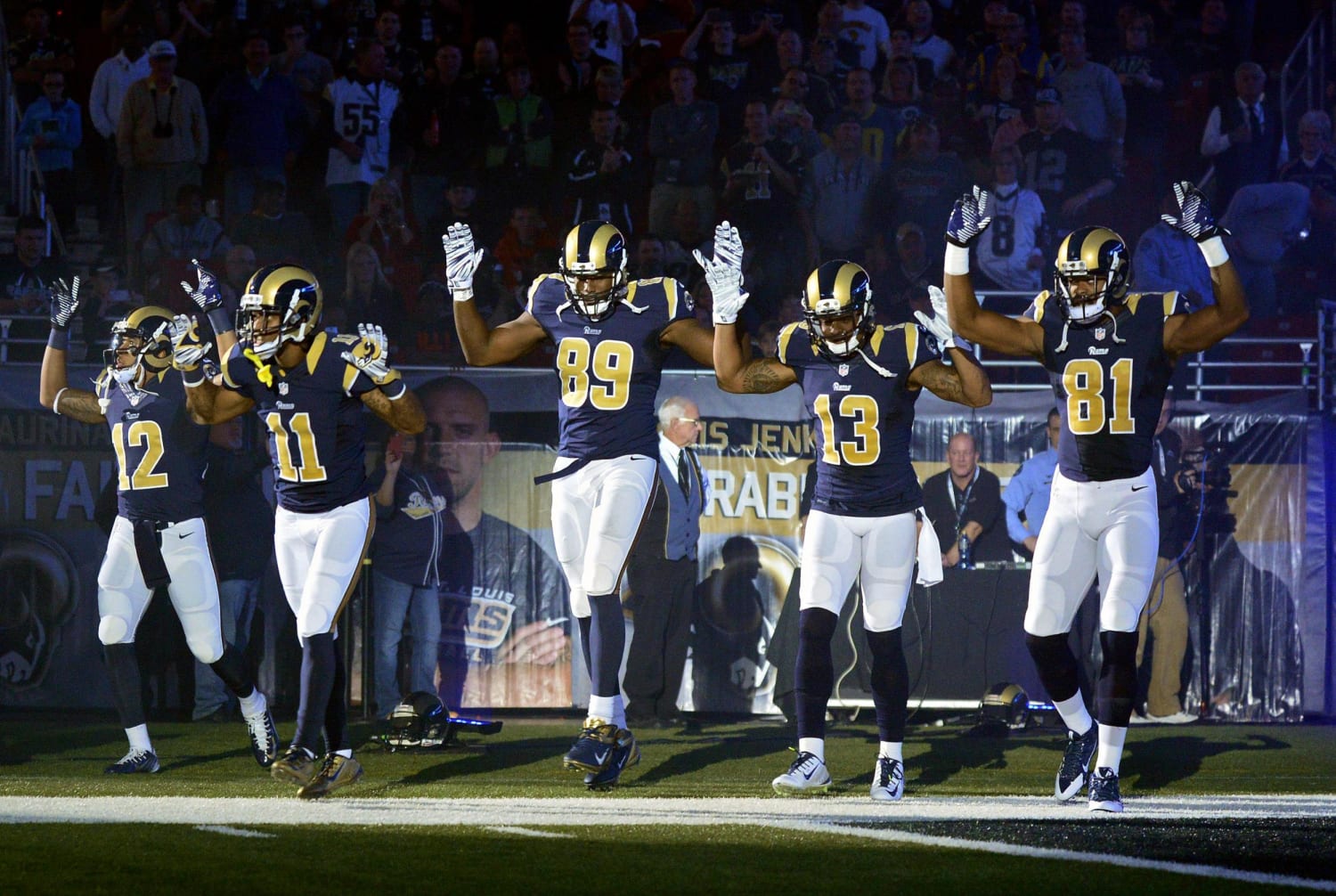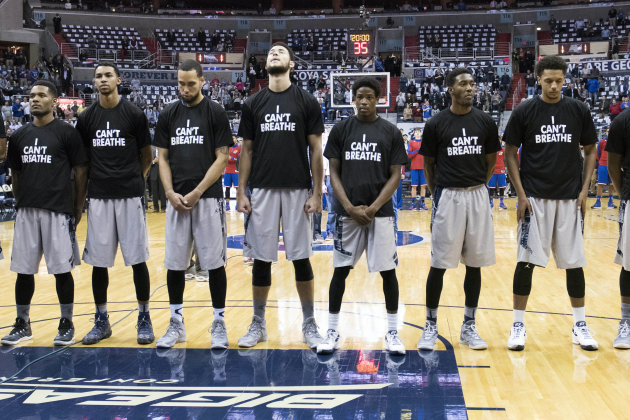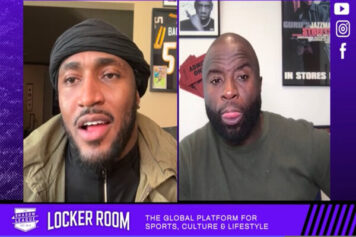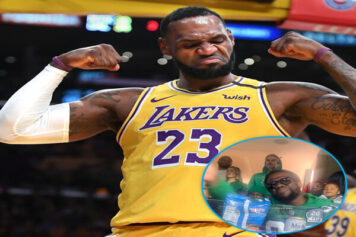For years communities of people of African descent across the globe have wished that our million dollar athletes would become more socially active and emerge as a voice for voiceless. While some of these athletes of African descent aren't ideal candidates for speaking up for social change and against injustice, the popularity of these athletes are in a unique position because of their popularity and financial status.
The path to activism isn’t something that all can readily grasp. Many athletes would rather collect their checks, their ladies, their endorsements and live a life of luxury and relative ease. But it wasn’t always that way. The past is filled with sterling examples of athletes who tried to go above and beyond the call of duty to alert the general population as to the injustices inflicted against people of African descent on a regular basis.
The great Jim Brown has been a staunch activist in the community for decades. Kareem Abdul Jabbar has a history of activism in the past that he has more recently revisited from a journalistic standpoint through books and his critically-acclaimed column in Time magazine. Yet for the most part, athletes who have engaged in activism have appeared infrequently or not at all over the past 30 years. Remember Craig Hodges of the Chicago Bulls? He was basically forced into retirement for showing up at the White House in full African garb and presenting then President George H.W. Bush with a letter of grievances from the African American community. That was all the way back in 1992. After him, there have been relatively none, at least to that magnitude. Truth be told, his act was more symbolic than anything. A flickering flame in a gale force wind of white supremacy. Black America was waiting for a new champion to take up the cause, one that would need to be brave and big, so big and such a perineal winner that his opinion of justice in the modern era can be undeniable, his charisma only matched by his sincerity.
Though Cleveland Cavaliers’ superstar LeBron James had mentioned in an interview with ESPN seven years ago that he would like to pick up the mantle of Muhammad Ali and become a champion in the arena of social justice, that message had seemed to fall by the wayside. Yet in the last few years, King James has used his status to bring attention to the cause of justice and equality for the Black man in America through various displays of protest.
The first instance was when he and the Miami Heat donned hoodies and posted the photos on social media in response to the Trayvon Martin tragedy of 2013. Even after that was done, there were still those within the community who felt that most athletes of African descent were insulated from the community by money and fame for too long a period of time, thus could not relate to the everyday struggles against racism, classism and poverty that afflicted those that were living hand to mouth. Some believed that professional athletes were doing enough by creating celebrity charities, foundations and such, but the lending of one's voice in favor of one's less fortunate countryman is of far more immediate value. For the vast majority of athletes in the major team sports, retirement or injury significantly impacts their ability to impact anything financially. Only the top tenths, the financial foundation for the descendants of athletes like Jordan, Magic and Kobe are protected for generations, but that is not the norm.
Our legacy outlasts us all so why not have it be a legacy of justice?
With the recent political unrest regarding police brutality, police shootings of unarmed citizens and their subsequent acquittals by grand juries from Ferguson, MO, to New York City and Los Angeles, many athletes of African descent in America have begun taking baby steps toward activism and social awareness.
As has been the case with most controversial issues in the past ten years, many made their opinions known via social media.
LeBron posted his initial feelings via Instagram, making a comparison between Trayvon Martin and Mike Brown. “As a society how do we do better and stop things like this happening time after time!!” James wrote Monday night on Instagram. “I’m so sorry to these families. Violence is not the answer people. Retaliation isn’t the solution as well. #PrayersUpToTheFamilies #WeHaveToDoBetter” He wrote.
Serena Williams, Damian Lillard, Reggie Bush, Matt Barnes, Jason Thompson, Malcolm Jenkins and a slew of other professional athletes spoke out on the matter when the announcement of no indictment against Ferguson Police Officer Darren Wilson back on November 25. Since that time, athletes of African descent from most major professional sports leagues have spoken on the situation verbally or in another manner. Remember back in April, when Los Angeles Lakers shooting guard Kobe Bryant was taken to task for warning Black folks against taking sides in any dispute based upon race? Well, the Mike Brown situation finally passed his litmus test of injustice. “The system enables young black men to be killed behind the mask of law #Ferguson #tippingpoint #change”. As far as the normally apolitical Kobe Bryant is concerned, those comments were downright militant. Magic Johnson, who avoided speaking outwardly on matters of race and class as a member of the Los Angeles Lakers and as a successful business man for decades thereafter, had this to say regarding the increased instances of athletic activism and social awareness.

“They have to get involved socially. They have to because it affects them, too. And it affects their families. They grew up in these situations; they must not forget that. LeBron is a great example of doing a wonderful job. When this first came out, when you think about everything that he stood up for — the Donald Sterling thing, when that mess happened, just now with these young people being shot down unarmed, he’s been right out front, so I’ve got to give him a lot of credit. If he’s out front being the best player, then the other guys usually follow the best guy.”
That was high praise indeed from one of the most successful African Americans in professional sports. Since Magic made those statements, there have been no fewer than 20 incidents of athletes supporting the ongoing protest against the aforementioned miscarriages of justice by wearing t-shirts that read ‘I Can’t Breathe”.

It all started when Derrick Rose wore the aforementioned shirt in warmups during the Bulls' game against the Warriors on December 6th, which incited both waves of support and a rash of criticism. Then during a recent game between the Cleveland Cavaliers and the Brooklyn Nets, LeBron James and Kyrie Irving of the Cavs donned the shirts, which were printed up by Justice League of NY, and Brooklyn Nets Kevin Garnett, Deron Williams, and Anthony Anderson wore them alongside media mogul and sports agent Jay Z. The phenomenon then spread across the country as Kobe Bryant, Swaggy P, Carlos Bozier and Jeremy Lin, the only non-person of African descent to be seen wearing one. Damian Lillard of the Portland Trailblazers wore the shirt also, and even the Georgetown Hoyas got in on the act as the entire team wore the shirt before their game against No.10 Kansas.
But just because activism is the cause celebre these days doesn’t mean there aren’t a plethora of haters out there. Nevermind the neo-antebellum ignorance spouted by Charles Barkley on a month basis, but when St. Louis Rams players Tavon Austin, Stedman Bailey, Chris Givens, Kenny Britt and Jared Cook marched out of the tunnel with the “Hands Up, Don’t Shoot” protest, a local police union jumped all down the Rams’ throats with all kinds of threats and racist code speak thrown at them.
“profoundly disappointed with the members of the St. Louis Rams football team who chose to ignore the mountains of evidence released from the St. Louis County Grand Jury this week and engage in a display that police officers around the nation found tasteless, offensive and inflammatory.”
“The SLPOA is calling for the players involved to be disciplined and for the Rams and the NFL to deliver a very public apology,” the statement said.

That apology never came directly from the St. Louis Rams, although the police union begs to differ, but the Rams did concede a bit by donating to a police charity. The relationship between the police department and the African American community is one that has been sour from the very start, and explaining this very complicated relationship to the masses is difficult enough. But when certain individuals in the majority aren’t even trying to understand then that task becomes exponentially more difficult.
CBS college basketball commentator Doug Gottlieb is a former basketball player himself and has played at a high level while attending Notre Dame. He has been around Black people throughout his career and one would think he would be cognicient of something we would be univerally offended by. Apparently not.
He issued a tweet that read:
“Kobe Bryant lives in Newport Coast, takes a chopper to games, made $60 million last 2 years..the struggle is real #ICANTBREATHE”.
Blinded by white privilege, Gottlieb hijacked a theme of a movement birthed from the death of Eric Garner. During the confrontation, Garner was heard saying "I Can't Breathe" over 10 times. But he used it as a dig on Kobe, who he clearly has some predetermined animus toward. But that's just how haters roll. Ignorant and disrespectful.
Gottlieb then apologized for the tweet after deleting it. However, his position had already been revealed. He believes African American athletes who speak up on such things are worthy of ridicule. Additionally, Chicago Bulls point guard Derrick Rose was doubted because of his resolve as sports radio host Dan Bernstein said Rose was too “inarticulate” to defend his position. Bernstein has since been raked over the coals by Black Twitter and journalists of African descent as well. Most notably, Ebony Digital Senior Editor Jamilah Lemieux went off on Bernstein.
The cause has now been picked up by athletes in other sports. Later today in Las Vegas, former two-time Welterweight Champion Andre Berto will join a group of professional boxers that include Peter Quillin, Shawn Porter, Zab Judah, the Charlo Brothers, Errol Spence and trainer Virgil Hunter, in a rally for justice dubbed "Black Out Boxing." Berto, who had participated in Black Out Hollywood alongside Tyrese, is ensuring that the sport of boxing expresses its voice in support of the cause. He spoke with us of his motivation behind the event.
"This isn't a money situation. This is a situation where we have to stand up for our rights and we have to put in the time to come out and show your effort. I think that holds a lot more weight than anything else that you can do. We have strength in numbers. So, we continue to be consistent, continue showing up, continue knocking on that door and physically being active, I believe that holds a lot more weight than just showing up and throwing money in all directions and just leaving. That will never work. We have to stand strong and we have to continue being consistent on this situation."
It would seem that most white folks would rather have their colored athletes just shut up and play ball. But activism has always been a part of the African American experience in sports and had only waned with the increased contracts and endorsements of those players at the top of the food chain. Why wouldn’t these men speak up against tyranny? Because of their financial standing? A bullet is not going to check their bank account. A hoodie wearing Black man on a dimly lit street will be treated as a threat, whether riding a bike or driving a Bentley. Green can't protect Black.
You can hide your religion, political affiliation, sexual preference and many other things, but you can't hide your skin color.
This is why Black athletes are right for finally picking up the baton again.
And this is why Black athletes needed to light the torch of social activism once more.





